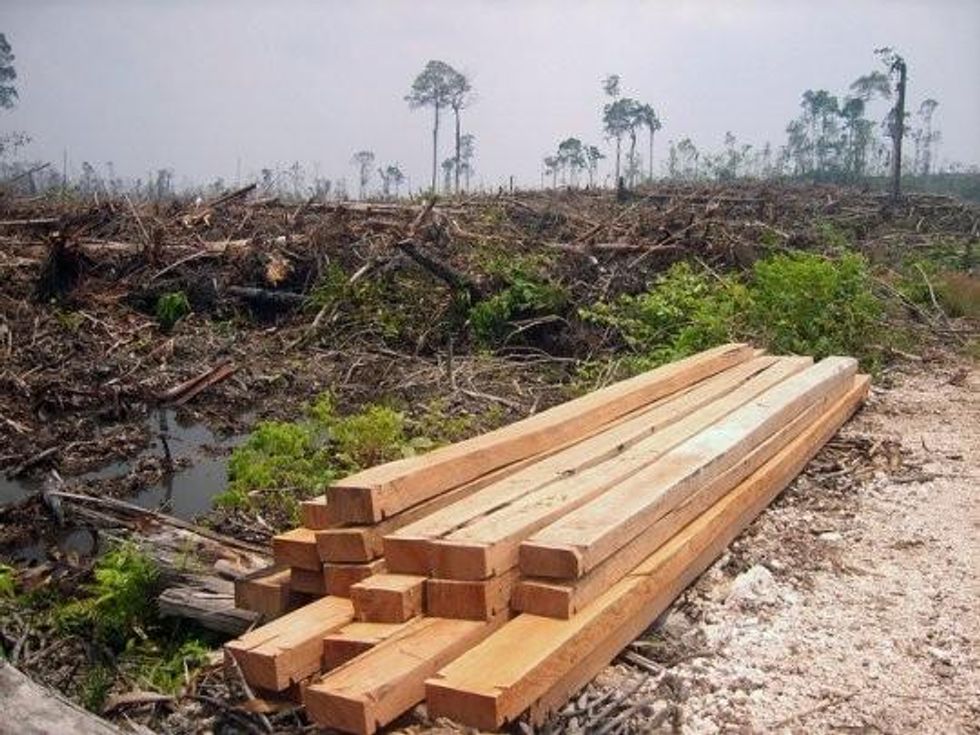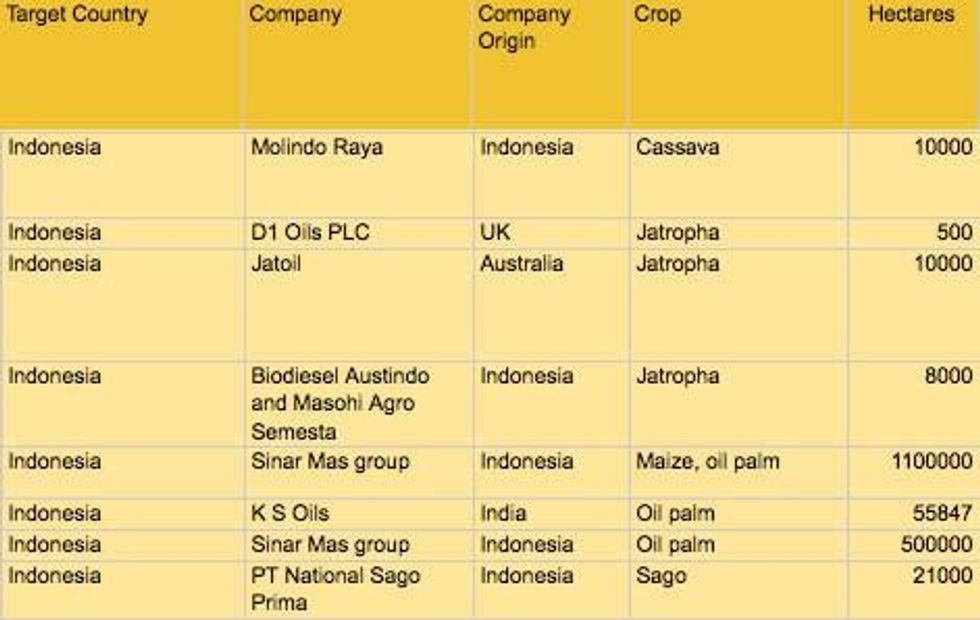'Corporate Colonialism' Runs Wild as 'Growth' Bulldozes Forests
Multinational corporations seizing, deforesting land in Indonesia

In the match between corporate power and the poor in the archipelago, the number of conflicts is on the rise. Vidal reports that
More than 600 were recorded in 2011, with 22 deaths and hundreds of injuries. The true number is probably far greater, say watchdog groups.
"The scale of the conflicts is growing. Every day new ones are reported. More and more police are now in the plantations. Government is trying to clamp down on mass protests," Vidal reports Abetnego Tarigan, director of Friends of the Earth Indonesia in Jakarta, as saying.
"Who controls the land in Indonesia controls the politics. Corruption is massive around natural resources. We are seeing a new corporate colonialism. In the Suharto era you were sent to prison for talking about the government. Now you can be sent there for talking about corporations," says Tarigan.
Here, as in so much of the world, corporate power trumps all.
"These developments are classed as 'growth' but what we are seeing is the collapse of communities of fisherfolk or farmers and increasing poverty," he continues. "We are exchanging biodiversity for monocultures, local economies for global ones, small-scale producers are becoming labourers and community land is becoming corporate. This is the direction we are going."
One problem for communities is the growing number of palm oil plantations, which, Henry Sarigih, founder of the Indonesian Peasant Union, says "has spawned a new poverty and is triggering a crisis of landlessness and hunger."
The table below from the non-profit organization GRAIN shows hundreds of thousands of hectares seized in reported land grabs in Indonesia between 2002 and 2012 where the stated intention of the investors is the production of biofuels:

Another name behind the Indonesian land grabs is the Minneapolis-based BigAgriculture giant Cargill.
As environmental group Rainforest Action Network (RAN), which has campaigned extensively on stopping the ecologically damaging palm oil expansions, has noted, the company has "recently announced its plan to expand their Indonesian palm oil plantations." This is pushing the Sumatran orangutan close to extinction as well as contributing to massive carbon dioxide-emitting slash-and-burn practices.
"It's a perfect storm of human rights abuses and social conflict on the one hand and the destruction of some of the most biologically diverse forests in the world on the other," said Laurel Sutherlin, communications director for RAN.
Ultimately, saving the Indonesian forests will save all of us.
"Of course, it's not just local communities and wildlife that need to be protected from bulldozers and forest fires," writes RAN's Gemma Tillack. "Indonesia's rainforests are a valuable carbon sink--destroying them would make our climate problem that much worse, imperiling the future of everyone on this planet just to enrich a few well-connected businessmen."
_________________________
An Urgent Message From Our Co-Founder
Dear Common Dreams reader, The U.S. is on a fast track to authoritarianism like nothing I've ever seen. Meanwhile, corporate news outlets are utterly capitulating to Trump, twisting their coverage to avoid drawing his ire while lining up to stuff cash in his pockets. That's why I believe that Common Dreams is doing the best and most consequential reporting that we've ever done. Our small but mighty team is a progressive reporting powerhouse, covering the news every day that the corporate media never will. Our mission has always been simple: To inform. To inspire. And to ignite change for the common good. Now here's the key piece that I want all our readers to understand: None of this would be possible without your financial support. That's not just some fundraising cliche. It's the absolute and literal truth. We don't accept corporate advertising and never will. We don't have a paywall because we don't think people should be blocked from critical news based on their ability to pay. Everything we do is funded by the donations of readers like you. Will you donate now to help power the nonprofit, independent reporting of Common Dreams? Thank you for being a vital member of our community. Together, we can keep independent journalism alive when it’s needed most. - Craig Brown, Co-founder |

In the match between corporate power and the poor in the archipelago, the number of conflicts is on the rise. Vidal reports that
More than 600 were recorded in 2011, with 22 deaths and hundreds of injuries. The true number is probably far greater, say watchdog groups.
"The scale of the conflicts is growing. Every day new ones are reported. More and more police are now in the plantations. Government is trying to clamp down on mass protests," Vidal reports Abetnego Tarigan, director of Friends of the Earth Indonesia in Jakarta, as saying.
"Who controls the land in Indonesia controls the politics. Corruption is massive around natural resources. We are seeing a new corporate colonialism. In the Suharto era you were sent to prison for talking about the government. Now you can be sent there for talking about corporations," says Tarigan.
Here, as in so much of the world, corporate power trumps all.
"These developments are classed as 'growth' but what we are seeing is the collapse of communities of fisherfolk or farmers and increasing poverty," he continues. "We are exchanging biodiversity for monocultures, local economies for global ones, small-scale producers are becoming labourers and community land is becoming corporate. This is the direction we are going."
One problem for communities is the growing number of palm oil plantations, which, Henry Sarigih, founder of the Indonesian Peasant Union, says "has spawned a new poverty and is triggering a crisis of landlessness and hunger."
The table below from the non-profit organization GRAIN shows hundreds of thousands of hectares seized in reported land grabs in Indonesia between 2002 and 2012 where the stated intention of the investors is the production of biofuels:

Another name behind the Indonesian land grabs is the Minneapolis-based BigAgriculture giant Cargill.
As environmental group Rainforest Action Network (RAN), which has campaigned extensively on stopping the ecologically damaging palm oil expansions, has noted, the company has "recently announced its plan to expand their Indonesian palm oil plantations." This is pushing the Sumatran orangutan close to extinction as well as contributing to massive carbon dioxide-emitting slash-and-burn practices.
"It's a perfect storm of human rights abuses and social conflict on the one hand and the destruction of some of the most biologically diverse forests in the world on the other," said Laurel Sutherlin, communications director for RAN.
Ultimately, saving the Indonesian forests will save all of us.
"Of course, it's not just local communities and wildlife that need to be protected from bulldozers and forest fires," writes RAN's Gemma Tillack. "Indonesia's rainforests are a valuable carbon sink--destroying them would make our climate problem that much worse, imperiling the future of everyone on this planet just to enrich a few well-connected businessmen."
_________________________

In the match between corporate power and the poor in the archipelago, the number of conflicts is on the rise. Vidal reports that
More than 600 were recorded in 2011, with 22 deaths and hundreds of injuries. The true number is probably far greater, say watchdog groups.
"The scale of the conflicts is growing. Every day new ones are reported. More and more police are now in the plantations. Government is trying to clamp down on mass protests," Vidal reports Abetnego Tarigan, director of Friends of the Earth Indonesia in Jakarta, as saying.
"Who controls the land in Indonesia controls the politics. Corruption is massive around natural resources. We are seeing a new corporate colonialism. In the Suharto era you were sent to prison for talking about the government. Now you can be sent there for talking about corporations," says Tarigan.
Here, as in so much of the world, corporate power trumps all.
"These developments are classed as 'growth' but what we are seeing is the collapse of communities of fisherfolk or farmers and increasing poverty," he continues. "We are exchanging biodiversity for monocultures, local economies for global ones, small-scale producers are becoming labourers and community land is becoming corporate. This is the direction we are going."
One problem for communities is the growing number of palm oil plantations, which, Henry Sarigih, founder of the Indonesian Peasant Union, says "has spawned a new poverty and is triggering a crisis of landlessness and hunger."
The table below from the non-profit organization GRAIN shows hundreds of thousands of hectares seized in reported land grabs in Indonesia between 2002 and 2012 where the stated intention of the investors is the production of biofuels:

Another name behind the Indonesian land grabs is the Minneapolis-based BigAgriculture giant Cargill.
As environmental group Rainforest Action Network (RAN), which has campaigned extensively on stopping the ecologically damaging palm oil expansions, has noted, the company has "recently announced its plan to expand their Indonesian palm oil plantations." This is pushing the Sumatran orangutan close to extinction as well as contributing to massive carbon dioxide-emitting slash-and-burn practices.
"It's a perfect storm of human rights abuses and social conflict on the one hand and the destruction of some of the most biologically diverse forests in the world on the other," said Laurel Sutherlin, communications director for RAN.
Ultimately, saving the Indonesian forests will save all of us.
"Of course, it's not just local communities and wildlife that need to be protected from bulldozers and forest fires," writes RAN's Gemma Tillack. "Indonesia's rainforests are a valuable carbon sink--destroying them would make our climate problem that much worse, imperiling the future of everyone on this planet just to enrich a few well-connected businessmen."
_________________________

